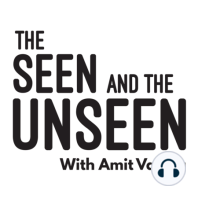22 min listen

Ep 244: The Multitudes of Our Maharajahs
Ep 244: The Multitudes of Our Maharajahs
ratings:
Length:
202 minutes
Released:
Sep 27, 2021
Format:
Podcast episode
Description
India's Maharajahs get a bad rap. Both the British empire and our freedom fighters pushed wrong stereotypes about them. Manu Pillai joins Amit Varma in episode 244 of The Seen and the Unseen to chat about the multitudes of our maharajahs -- and much else that matters. Also check out: 1. Manu Pillai's Website, Twitter and Instagram. 2. False Allies: India’s Maharajahs in the Age of Ravi Varma -- Manu Pillai. 3. Ivory Throne: Chronicles of the House of Travancore -- Manu Pillai. 4. Rebel Sultans: The Deccan from Khilji to Shivaji -- Manu Pillai. 5. The Courtesan, the Mahatma and the Italian Brahmin -- Manu Pillai. 6. Kerala and the Ivory Throne -- Episode 156 of The Seen and the Unseen (w Manu Pillai). 7. Our Colorful Past -- Episode 127 of The Seen and the Unseen (w Manu Pillai). 8. The Deccan Before Shivaji -- Episode 98 of The Seen and the Unseen (w Manu Pillai). 9. Sudhir Sarnobat's epic tweet summing up the first 200 episodes of The Seen and the Unseen. 10. The Hunter Becomes the Hunted -- Episode 200 of The Seen and the Unseen. 11. A Matter of Rats -- Amitava Kumar. 12. Piercing -- Ryu Murakami. 13. Eichmann in Jerusalem: A Report on the Banality of Evil -- Hannah Arendt. 14. SPQR: A History of Ancient Rome -- Mary Beard. 15. The Mapilla Rebellion of Malabar -- Manu Pillai. 16. The many shades of the Mappila insurrection -- Manu Pillai. 17. Malevolent Republic — Kapil Komireddi. 18. Who Broke Our Republic? -- Episode 163 of The Seen and the Unseen (w Kapil Komireddi). 19. Religion in India: Tolerance and Segregation -- The Pew Center Research survey of religion in India. (Also: 1, 2.) 20. A Meditation on Form -- Amit Varma. 21. Naoroji: Pioneer of Indian Nationalism — Dinyar Patel. 22. Dadabhai Naoroji and the Fight for India -- Episode 187 of The Seen and the Unseen (w Dinyar Patel). 23. Understanding India Through Its Languages -- Peggy Mohan. 24. Young India -- Episode 83 of The Seen and the Unseen (w Snigdha Poonam). 25. Royals and Rebels: The Rise and Fall of the Sikh Empire -- Priya Atwal. 26. VP Menon: The Unsung Architect of Modern India — Narayani Basu. 27. India’s Greatest Civil Servant -- Episode 167 of The Seen and the Unseen (w Narayani Basu). 28. India’s Security State -- Episode 242 of The Seen and the Unseen (w Josy Joseph). 29. Lessons from 1975 -- Amit Varma (2015 piece). 30. There Comes Papa. Please subscribe to The India Uncut Newsletter. It’s free! And check out Amit’s online course, The Art of Clear Writing.
Released:
Sep 27, 2021
Format:
Podcast episode
Titles in the series (100)
Ep. 18: Restaurant Regulations: If you want to see the many ways in which the government resembles a hafta-extorting mafia, look no further than restaurant regulations. They come about with a noble stated intent, but end up harming both consumers and restaurants. Madhu Menon joins... by The Seen and the Unseen - hosted by Amit Varma